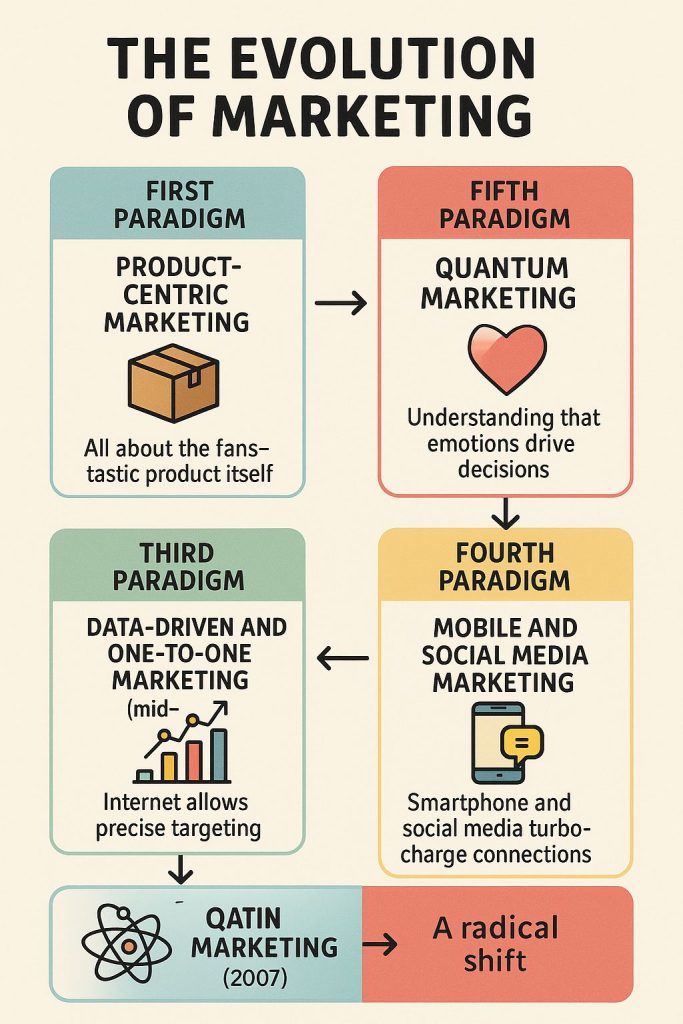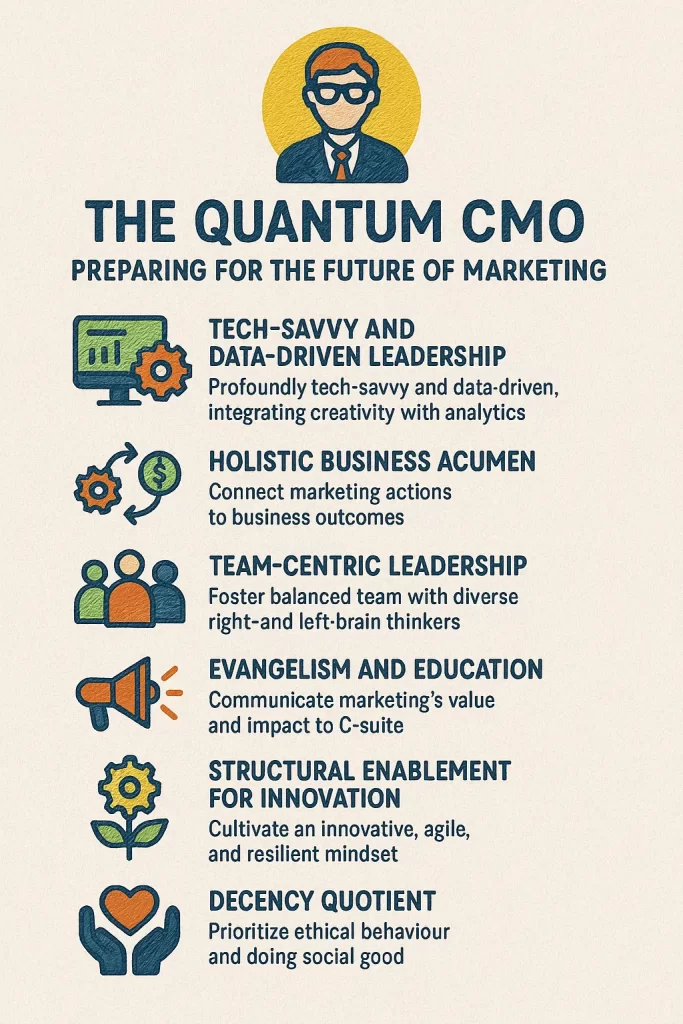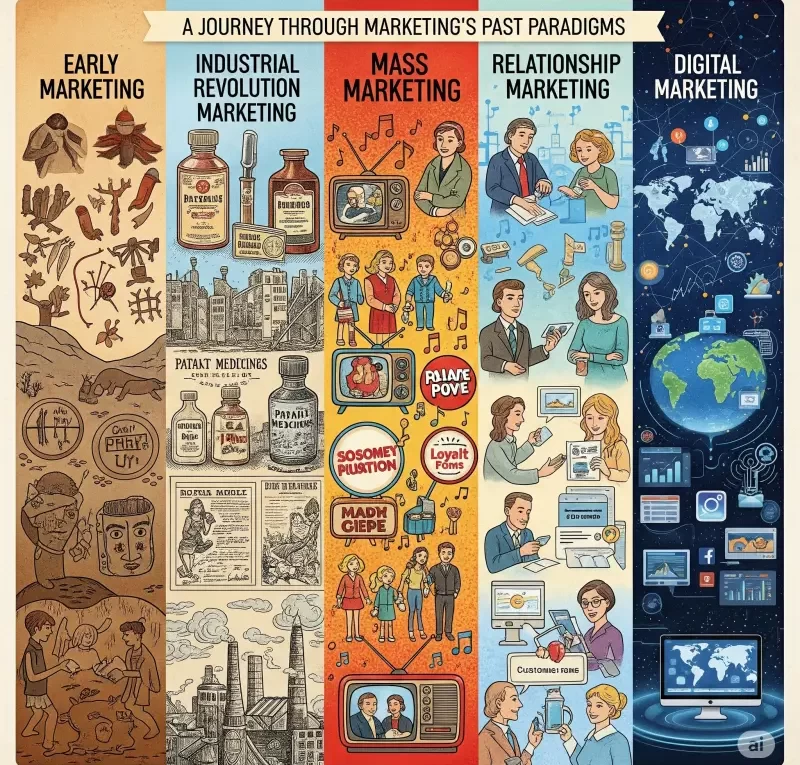The Quantum Leap: Navigating the Evolution of Marketing Paradigms
Marketing, from its nascent beginnings, has undergone profound transformations, continually adapting to shifts in consumer behaviour, technological advancements, and cultural landscapes. We’re now standing at the cusp of the fifth and most radical paradigm shift yet: Quantum Marketing. This new era redefines every established theory and principle of classical marketing.
A Journey Through Marketing’s Past Paradigms
Before we delve into the quantum future, let’s briefly trace the path that led us here, through four distinct historical paradigms:
- The First Paradigm: Product-Centric Marketing In this foundational era, the belief was simple: a fantastic product, attractively packaged, reasonably priced, and widely available, would naturally draw consumers. The underlying assumption was that people were entirely logical and rational in their purchasing decisions. However, the rise of mass production soon challenged this simplistic view.
- The Second Paradigm: Emotional Marketing Marketers swiftly recognised the profound influence of psychology, understanding that human decisions are often irrational and driven by emotions and feelings. The focus shifted to evoking the right sentiments, demonstrating that a product could become a market leader through positive associations, even without extensive direct promotion (e.g., “things go better with Coke”).
- The Third Paradigm: Data-Driven and One-to-One Marketing The mid-1990s heralded the advent of the internet, creating an “all the time prime time” for connections. For the first time, marketers could engage with individuals on a one-to-one basis. This era saw the emergence of data analytics as a crucial tool, enabling precise targeting over a “spray and pray” approach and allowing for the measurement of campaign effectiveness, thus giving rise to digital marketing.
- The Fourth Paradigm: Mobile and Social Media Marketing 2007 marked another pivotal moment with the launch of the smartphone and social media. Smartphones became deeply ingrained in daily life, checked hundreds of times a day, while social media fostered vast connections and sharing. This era turbocharged the speed, specificity, and omnipresence of individualized marketing, ushering in mobile, social media, and influencer marketing.

The Fifth Paradigm: Embracing Quantum Marketing
We are now on the cusp of Quantum Marketing, a truly radically different approach. This transformation is propelled by several powerful forces:
- Technological Disruptions: We are witnessing exponential advancements driven by over 24 powerful technologies, including Artificial Intelligence (AI), Augmented Reality (AR), Virtual Reality (VR), autonomous vehicles, the Internet of Things (IoT), wearables, blockchain, and 5G. AI, for instance, is poised to revolutionise every aspect of marketing, from consumer insights to campaign creation, offering unprecedented speed, variety, and economic efficiency. Blockchain also offers potential for transparency and trust in areas like ad payments.
- Cultural Shifts: Significant cultural changes are unfolding alongside technological advancements, demanding a new marketing approach.
- Data Deluge: An infinite amount of data is being generated by connected devices, providing marketers with unparalleled insights into consumer behaviour. This, however, necessitates navigating a complex landscape of privacy regulations.
The Core Tenets: A New Marketing Approach and Strategy
Quantum Marketing is grounded in humanity and principled in its approach. Its foundational tenets challenge traditional norms:
- Consumer-Centricity: The consumer truly takes centre stage. Marketing shifts from being intrusive to acting as a personal assistant, adeptly sensing consumer needs and serving them effectively.
- Privacy First: Consumer privacy is paramount and cannot be compromised. Technological breakthroughs now enable targeted marketing without needing personally identifiable information (PII). Companies must prioritise “privacy by design,” minimising data collection from the start, ensuring accountability for data protection, and only collecting essential data.
- Consumer Economics: A transformative concept, consumers will gain economic benefits for their attention, with a portion of advertising revenue returning to them. They will also have the right to control the type and frequency of ads they receive .
- Multi-Sensory and Experiences-Led Marketing: The strategy pivots from traditional advertising to immersive experiences. Brands will curate experiences (like concerts or sporting events) that tap into all five senses to forge strong feelings and emotions associated with the brand, rather than simply promoting a product. Mastercard’s “Priceless.com” exemplifies this.
- Brand Trust and Social Good: Trust is the most crucial foundation. While most consumers currently lack trust in the brands they buy from, Quantum Marketing emphasises earning trust through transparency, authenticity, and genuinely doing social good. This means aligning with a genuine purpose beyond just selling products, as demonstrated by Mastercard’s initiatives like the True Name card for the transgender community, the Touch Card for visually impaired individuals, and an AI-powered app assisting Ukrainian refugees in Poland. Such actions cultivate profound brand love and open new business opportunities .
- The Power of Data and AI: The shift from “data to insights” is paramount, as many companies are “rich in data but poor in insights”. AI can transform raw data into “actionable insights” by identifying patterns and informing decision-making. AI offers unprecedented efficiency and automation, able to generate “10,000 variants of an ad in 20 seconds,” freeing humans for “high quality high value tasks”. AI models can predict ad effectiveness with an “86% correlation to actually predicting sales”. It’s seen as a task shifter, not a job destroyer, allowing human marketers to focus on more complex, creative, and strategic work.
- Reimagining Loyalty and Authenticity: Traditional loyalty programs, despite trillions spent, are deemed a “complete waste of money”. The focus moves to “preference management”. Brands like Liquid Death succeed by creating entertainment and comedy that people want to share, rather than conventional marketing, leveraging organic reach. Legacy brands can achieve “cultural relevance” by re-aligning with their purpose and leveraging their brands as “IP” for deeper engagement, as seen with Mattel’s Barbie. Strategic partnerships with startups and tech firms are also crucial for innovative solutions.
The Quantum CMO: Preparing for the Future of Marketing
This revolutionary era demands a new breed of leader: the Quantum Chief Marketing Officer. The traditional CMO role, often perceived as an “Arts and Crafts division,” is under threat, and a Quantum CMO is essential to reclaim marketing’s “glory”.

Here’s what a Quantum CMO must prepare for:
- Tech-Savvy and Data-Driven Leadership: This individual must be profoundly tech-savvy and data-driven, capable of seamlessly integrating creativity with analytics.
- Holistic Business Acumen: Marketers must learn to “speak the language of marketing,” clearly connecting marketing actions to business outcomes. This involves influencing not just promotion, but also “product generation,” “pricing,” and other business variables.
- Team-Centric Leadership: An individual CMO rarely possesses all the necessary characteristics. The focus shifts to building a “Leonardo DaVinci kind of team” where collective strengths cover all areas, fostering a balanced team with both right-brain (creativity, psychology) and left-brain (data, technology, finance) thinkers. This requires self-awareness and deep trust in team members.
- Evangelism and Education: The Quantum CMO must “evangelize marketing,” effectively communicating its value and impact to CEOs and other C-suite executives using quantitative metrics.
- Structural Enablement for Innovation: Organisations must cultivate a “mindset of innovation,” including a “tolerance to failure when you’re testing and learning” and “agility to fail fast”.
- Decency Quotient: Marketing leaders must possess a “decency quotient,” prioritising ethical behaviour and “doing social good” from a “true sense of purpose,” which builds trust and delivers “huge amount of impact” over the long term.
- Responsible AI Use: There’s a critical need for caution regarding AI. Marketers must avoid “dangerously trusting the engine to think and do for them what they should be actually questioning” and work towards “common standards” in data flow and responsible AI development. The urgency of AI adoption is clear: marketers must “start doing things right now” and “learn by doing”.
In essence, Quantum Marketing aims to transform marketing from an often intrusive and manipulative practice into a personal, empathetic, relevant, and joyful experience for consumers. Companies that fail to adapt to this fundamentally reimagined approach risk irrelevancy. The future of marketing demands a “quantum leap” forward, integrating creativity with data, speaking the language of business, and advocating for its pivotal role in driving both profit and purpose.
